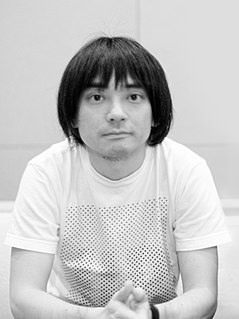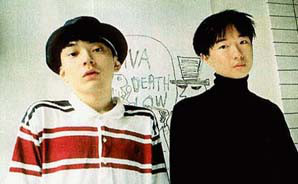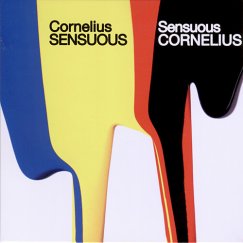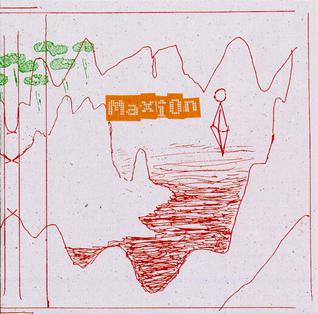
Keigo Oyamada, also known by his moniker Cornelius, is a Japanese musician and producer who co-founded Flipper's Guitar, an influential Shibuya-kei band, and subsequently embarked on a solo career. In 1997, he released the album Fantasma, which landed him praise from American music critics, who called him a "modern-day Brian Wilson" or the "Japanese Beck".

Flipper's Guitar (フリッパーズ・ギター) were a Tokyo-based rock band led by Keigo Oyamada and Kenji Ozawa. The band were influenced by the chirpy sound of British 80s pop and post-punk groups like Haircut 100, Exhibit B, Orange Juice, The Style Council and Aztec Camera, as well as the fashionably eclectic sounds of early 90s Britain, from alternative dance to acid jazz.
Mari Hiki, better known by her stage name Kahimi Karie, is a Japanese singer, songwriter and photographer. Her music is closely associated with the Shibuya-kei aesthetic. Karie sings in English, French and Japanese, among other languages.

K.K.K.K.K. is the second studio album by Japanese musician Kahimi Karie. It was released on July 15, 1998 by Crue-L Records and Polydor Records. In the United States, K.K.K.K.K. was issued on October 26, 1999 by Le Grand Magistery, following Kahimi Karie (1998) as Karie's second American album release.

Kahimi Karie is a compilation album by Japanese musician Kahimi Karie. It was released on September 8, 1998 by Minty Fresh in the United States, serving as her debut album in the country. Kahimi Karie primarily consists of tracks from Karie's previous EPs and singles, excepting one track taken from her 1997 debut album Larme de Crocodile. It utilizes the cover art from Karie's 1995 EP My First Karie.

Sensuous is the fifth studio album by Japanese musician Cornelius. It was released on October 25, 2006 by Warner Music Japan. In the United States, the album was released on August 24, 2007 by Everloving Records. Sensuous peaked at number eight on the Oricon Albums Chart.

Holidays in the Sun is the debut EP by Japanese musician Cornelius. It was released on September 10, 1993 by Trattoria Records. The EP peaked at number 13 on the Oricon Albums Chart.

Maxi On is an EP by Japanese musician Takako Minekawa. It was released on July 12, 2000 by Trattoria Records. In the United States, it was released on November 14, 2000 by Emperor Norton Records. The EP is a collaboration with American indie rock band Dymaxion.

96/69 is the first remix album by Japanese musician Cornelius. It was released on June 9, 1996 by Trattoria Records. The album is a companion to Cornelius' second studio album 69/96, which was released the previous year. 96/69 peaked at number six on the Oricon Albums Chart.

Fun 9 is the fourth studio album by Japanese musician Takako Minekawa. It was released on July 7, 1999 by Polystar. The album was released on November 16, 1999 in the United States by Emperor Norton Records.

Point is the fourth studio album by Japanese musician Cornelius. It was released in Japan on October 24, 2001 by Trattoria Records, and in the United States on January 22, 2002 by Matador Records. Point peaked at number four on the Oricon Albums Chart. The album was reissued on CD by Warner Music Japan in 2019 with a second disc containing the Five Point One music video collection.

Fantasma is the third studio album by Japanese musician Cornelius, released on August 6, 1997 on his label Trattoria. Cornelius envisioned the album as "a one-on-one experience between the music and the listener. ... It starts with you entering into the journey and ends with you returning back to reality." It peaked at number six on the Oricon Albums Chart and number 37 on the UK Independent Albums Chart. Three singles were issued from the album: "Star Fruits Surf Rider", "Free Fall", and "Chapter 8 – Seashore and Horizon –".

The First Question Award (ザ・ファースト・クエスチョン・アワード) is the debut solo studio album by Japanese musician Cornelius. It was released on February 25, 1994 by Trattoria Records.
Hirohisa Horie is a Japanese musician and multi-instrumentalist. He plays primarily keyboards and guitar. Horie is one half of the Shibuya-kei duo Neil & Iraiza, and is known for his work with artists such as Kahimi Karie and Cornelius.
Trattoria Records is a Japanese record company. The record company was founded by Keigo Oyamada in 1993 and is currently owned by Polystar, a group of independent record labels.

OOIOO, originally released as ∞8∞ in Japan, is the debut album by the Japanoise band OOIOO.

Take Me to the Land of Hell is the 2013 album by Yoko Ono as Yoko Ono Plastic Ono Band. It is her fifteenth solo album overall and Ono's third since reforming the Plastic Ono Band in 2009 with her son Sean Lennon. It features guests Yuka C Honda, Keigo "Cornelius" Oyamada, Hirotaka "Shimmy" Shimizu, Yuko Araki, Nels Cline, Tune-Yards, Questlove, Ad-Rock & Mike D, Michael Leonhart, Bill Dobrow, Jared Samuel, Shahzad Ismaily, Lenny Kravitz, Andrew Wyatt, Erik Friedlander, Lois Martin, Joyce Hammann, Thomas Bartlett, Douglas Wieselman, Julian Lage, Toyoaki Mishima, Toru Takayama, Christopher Sean Powell, Christopher Allen, Andre Kellman, Michael H. Brauer, Bob Ludwig, Kevin Harper, Mark Bengston, Geoff Thorpe and Greg Kadel.

Mellow Waves is the sixth studio album by Japanese musician Cornelius. It was released on June 28, 2017 by Warner Music Japan. The album received generally positive reviews from music critics, and it reached the top ten of the Oricon Albums Chart in Japan and the Billboard World Albums chart in the United States.
Metafive is a Japanese super group. It consists of Yukihiro Takahashi, Towa Tei, Keigo Oyamada, Yoshinori Sunahara, Tomohiko Gondo, and Leo Imai.
The discography of Japanese musician Kahimi Karie consists of seven studio albums, five compilation albums, one remix album, six video albums, nine extended plays and nine singles.
















